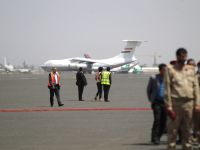Under the patronage of HH Sheikh Maktoum bin Mohamed bin Rashid Al Maktoum, Chairman of Dubai Technology and Media Free Zone Authority,
The GT Summit 2006, which concluded recently at the JW Marriott Hotel in Dubai, was duly acclaimed for its concerted efforts to promote and encourage the use of ICT in the government and public sectors throughout the Arab World.
H.E. Tariq Saeed Al-Noman, Undersecretary General Information Authority, UAE, said, “The GT Summit was a tremendous success, the topics presented addressed the issues facing the Arab World, in an attempt to better-serve their citizens through ICT development. It also reflected the development efforts in the UAE, under the leadership of HH Sheikh Khalifa bin Zayed Al-Nahyan.”
The event, organised by Dubai-based World Development Forum, in association with the United Nations Development Fund, Information & Communication Technologies for Development in the Arab Region (ICTDAR) and with the support of the League of Arab States, stressed the importance of implementing 19 viable projects passed under UN Summit Resolution No. 214, in Amman Jordan. The endorsement of the Arab strategy document for the society of (ICT) was approved and the Council of the Arab Ministers for Communications was commissioned to crystallize the document in the form of practical working programs and projects.
In his keynote address, Dr. Abed El-Rahman Sabry, Director of ICT for the Arab League of States pointed out that it was the responsibility of individual Arab Governments as well as key stakeholders in the private and public sectors to choose which ICT projects they needed to adopt. However they should take into consideration the seven basic pivots key to supporting the Arab digital strategy.
Successful implementation would help the Arab World to realise a series of strategic goals, the most important of which were, developing and adopting the frames and systematic orders for the for e-works, transactions and other ICT sectors, bridging the digital gap in the Arab world and raising awareness.
Other objectives included increasing and enhancing the Arab and Islamic digital content and maintaining Arab and Islamic heritage in addition to providing Arab information and knowledge effectively and easily.
The three-day summit provided a platform for senior IT decision-makers in the government and public services sectors throughout the Middle East to debate the cohesive and practical strategies required to establish an information society through sound e-governance for the common good of the Arab world.
The GT Summit an invitation-only event attracted high-level government ministerial officials in communications, commerce, education, finance, health, infrastructure and public works.
The comprehensive conference programme also addressed E-participation,
E-government, IT governance, risk and compliance management, business process management and resources capacity planning. IT related subjects will cover the actual dynamics such as smart IT infrastructures, enterprise architecture, integrated service delivery channels, connecting communities through Digital Cities and information security, access, collaboration and integration. Open networking sessions were held allow delegates to share their issues, concerns and potential solutions, in an interactive format.
Khaled Eid, Managing Director, The World Development Forum commented, “The overall objective for the GT Summit was to help identify the strategic technological opportunities, challenges and advantages of implementing ICT, so that unified government strategies could be implemented that will benefit the whole of the information society. We are certain that goal is now one step closer.”
The Summit signed off with a ‘Who’s Who of Government Technology’ awards ceremony. Leading public figures were honoured for making significant efforts to promote and encourage the use of ICT in the government and public sector in the Arab World and those who contributed towards the development of their organisations and societies.
The Leaders of Government Technology in the Arab World who were selected amongst the ‘Who's Who of Government Technology’ – Middle East,
included UAE recipients, H.E. Tariq Al Noman, Undersecretary of Government Information Authority, Mr. Salim Al Shair, Director, eServices – UAE and Dr. Hashem Ar-Refaei Director General of the e-Government Authority (EGA) – UAE.
Additional regional honours went to, Dr. Fahad Al Hoymany Minister's Advisor for IT, Head of E-Gov Infrastructure Dept., Saudi Arabia, Dr. Khalid AL-Tawil Director General of National Information Center, Saudi Arabia, Mr. Sameh Bedair e-Government Program Director, Egypt, Dr. Sherif Hashem, Executive Vice President (ITIDA) Egypt, Mr.Yaqoob Al-Bulushi Director General at Head Office & Supervisor of Info. System, Muscat Municipality, Oman and Colonel, Saleh Al Kubaisi Director of Information System Dept. Ministry of Interior, Qatar.
GT Summit was sponsored by Oracle, Intel, Trend Micro, eHosting DataFort, ITQAN with CNBC Arabia as media sponsor.
Summit Resolution No. 214, March 2001 Amman
Endorsement of the Arab strategy document for the society of (ICT) approved by the Council of the Arab ministers for Communications. The council to be commissioned to crystallize the document in the form of applicable working programs and activities.
Basic Pivots of the Information society
Infrastructure.
Human Development.
Electronic works including Electronic Government and E-commerce.
Information Environment.
Information transfer.
Communications and Information Technology Industry.
Supporting the Arab digital content.
Proposed projects
1-Arabization of Domains.*
2-Developing an Arab guiding system for E-works & dealings.
3-Developing an Arab guiding system for (ICT)*
4-Constructing a research engine in Arabic.
5-Linking Arab internets through NAPs.*
6-Developing an Arab guiding system for the Protection of intellectual property of programs and digital content.
7-Developing a mechanism for Arab coordination with relevant institutions in the (ICT) filed .
8-Establishing a network for supporting the development of open source software.
9-Providing a computer for each house.
10-Constructing an Arab digital library.
11-Establishing the Arab digital documentation center.*
12-Constructing the information clubs and convoys.
13-Low Tariff Internet.
14-Supporting S&M Companies to use information technology.
8-Establishing a network for supporting the development of open source software.
9-Providing a computer for each house.
10-Constructing an Arab digital library.
11-Establishing the Arab digital documentation center.*
12-Constructing the information clubs and convoys.
13-Low Tariff Internet.
14-Supporting S&M Companies to use information technology.
15-Arabization of (ICT).*
16-Constructing a regional gate to enhance the application of E- Government.*
17-Constructing incubators for (ICT) companies
18-Measurement indicators of information society and capacity building.*
19-supporting training of teachers on using information technology.







